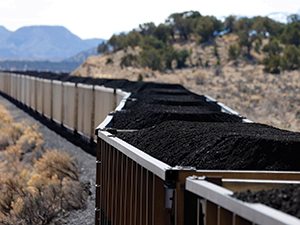
[miningmx.com] – TRANSNET, South Africa’s transport utility, was
confident it would sign off on a plan to expand coal rail capacity from the Waterberg in
the Limpopo province to 6 million tonnes a year (mtpa) from 2mpta.
Ali Motala, GM of Transnet’s Waterberg operations, said today a final decision by the
group’s executives would be made in October. “We hope to have this approved in
October. I am pretty confident but the group executives have to decide,” he said.
The increase in capacity to 6mtpa is part of a broader multi-stage expansion to
27mtpa that Motala said would cost roughly R5bn plus based on an earlier feasibility
study.
However, Motala said Transnet was reliant on coal producers coming to the party.
“TFR [Transnet Freight Rail] requires miners to be bold. The Waterberg is no longer a
far-fetched idea but it requires an industry that is visionary.”
The stage two expansion involves a number of strategic improvements on the rail line
such as the construction of a new loop at Thabazimbi of 2.8km and the creation of so-
called ‘double railway line’ at the Norite and Bleskop loops, Motala said.
Motala also said discussions regarding the railing of coal from Botswana’s coalfields,
such as Mmamabula, was “ongoing”. Although it was unlikely there would be material
developments in the next 18 months, Motala said “… we continue to engage”.
“We are very dependent on supply. We don’t want to develop more supply than South
Africa can handle,” he said.
Motala believed that future coal supply from southern Africa could total 200mtpa of
which 60mtpa would be from Botswana, 40mtpa from the Waterberg, and the balance
from Mpumalanga province.
Controversially, Motala said Transnet “had not abandoned” its plans for its own coal
export terminal. “We have not abandoned the terminal. We are very committed to the
development,” he said.
Brian Molefe, CEO of Transnet, said in February that following an agreement winning
it rail capacity for empowerment partners from BHP Billiton, the company would join
Richards Bay Coal Terminal (RBCT) in its expansion plans rather than building its own.
“BHP Billiton gave us the 1mt that we were asking for,’ said Molefe. “We’d been in
discussion with RBCT and industry and wanted to work together on expanding RBCT
or building a new one together,’ he said.
“We’ve not yet reached an agreement at this point and talks are ongoing. The
advantage of expanding with RBCT is that we would not have to lay out as much
capital,’ he said at the time.











